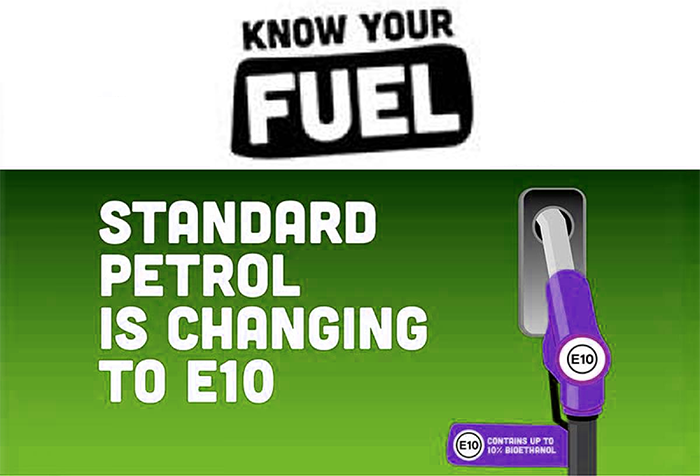Prepare for E10 becoming the standard petrol in Ireland

As part of measures to reduce carbon emissions, the level of plant-based ethanol in petrol sold on Irish forecourts is set to double from 5% to 10% from April 1st.
But what is plant-based ethanol and what does this increase mean for the average motorist in Ireland?
Firstly, What is Bio Ethanol?
Plant-based bio ethanol is a type of fuel additive made from renewable sources such as corn, sugarcane, or other plants. It is produced by a process of fermentation and distillation, which converts the natural sugars in the plants into ethanol.
When added to petrol, bio ethanol can help reduce harmful emissions, such as carbon monoxide and nitrogen oxides, and increase the octane rating of the fuel. This makes it a popular choice for use as a renewable and sustainable alternative to traditional petrol.
Additionally, plant-based bio ethanol is considered carbon neutral, meaning that it doesn't contribute to greenhouse gas emissions. This is because the carbon dioxide released when the fuel is burned is offset by the carbon dioxide absorbed by the plants, during their growth.
Overall, plant-based bio ethanol is a cleaner and more environmentally friendly fuel additive that can help to reduce the impact of transportation on the environment.
What is the Purpose of Adding Ethanol to Petrol?
While a small number of vehicles have been produced to run exclusively on ethanol, the majority of cars on the road run on petrol only. However, when added to petrol in a small concentration, ethanol reduces the amount of carbon emissions from the exhaust fumes, thereby helping to reduce greenhouse gas emissions that contribute to climate change.
This is not the only benefit. There are several distinct advantages in adding plant-based ethanol to petrol, such as:
A reduced dependence on fossil fuels:
As a renewable biofuel, plant-based ethanol reduces the reliance on non-renewable fossil fuels. This is particularly important in the face of diminishing oil reserves and increasing concerns about the environmental impact of fossil fuel extraction and consumption.
Ethanol provides a cleaner burning fuel:
When burned, ethanol produces fewer pollutants than petrol. This includes carbon monoxide, nitrogen oxides, and particulate matter, which are all harmful to human health and the environment. By blending ethanol with petrol, the resulting fuel burns cleaner, reducing the negative impact on air quality.
Crops used to produce ethanol supports local farmers:
Plant-based ethanol is produced from crops that are typically grown locally. This means that the production of ethanol can support local farmers and the rural economy, and provides farmers with a viable alternative to other types of environmentally harmful farming.
What Does the Increased Concentration of Bio Ethanol in Petrol Mean for the Irish Motorist?
The use of bio ethanol as a fuel additive in Ireland is regulated by the European Union's Renewable Energy Directive (RED), which sets targets for the use of renewable energy in transport. The RED requires that 10% of energy consumed in transport comes from renewable sources by 2020, which includes the use of biofuels such as bio ethanol.
To meet the RED targets, Ireland introduced the Biofuels Obligation Scheme (BOS) in 2010. Under the BOS, fuel suppliers are required to blend a certain amount of biofuels into their petrol and diesel fuels. It is intended to increase the amount of bio ethanol in petrol from the current 5% to 10% from April 1st.
Without doubt, the use of bio ethanol as a fuel additive has been a positive step. However, it can have some drawbacks. Bio ethanol can be corrosive to some engine components, which can lead to increased wear and additional maintenance costs. It can be particularly harmful to older and classic cars such as those manufactured before 2000. It may also have the effect of increasing fuel consumption by as much as 1 or 2%. So the question is, how much ethanol is too much? Some industry experts argue that not enough research has been done on the possible negative effects of increasing the ethanol content from 5% to 10%, and to inform the public of the introduction of the new fuel known as E10.
Most modern vehicles will be unaffected by the change. However, It is recommended that owners check their vehicle's specification to ensure that it is compatible with bio ethanol blends. It is also important to use the correct fuel grade and blend of bio ethanol, as using a higher percentage than recommended can cause damage to some engines.
Overall, the use of bio ethanol as a fuel additive in Ireland is an important step towards reducing carbon emissions and improving the environmental impact of transportation. While there may be implications for some motorists, these can be mitigated by careful use of fuels and maintenance of vehicles.
These benefits of correctly blended fuels make plant-based ethanol an attractive alternative to traditional petrol, as we work towards a more sustainable future.
Author

Justin Kavanagh
Justin Kavanagh is a recognised leader
in automotive intelligence and vehicle
data supply to the entire motor industry.
He has almost 20 years experience in
building systems from the ground up.
As the Managing Director of Vehicle
Management System, he understands the
need and importance of trustworthy and
reliable vehicle history and advice to
both the trade and the public.
Follow me on LinkedIn